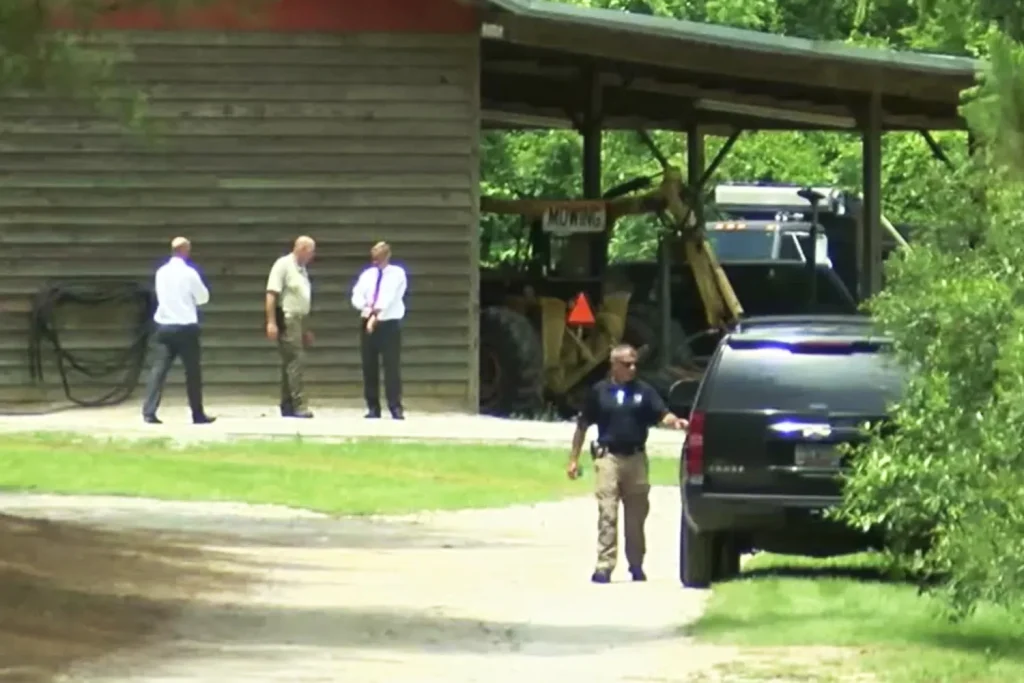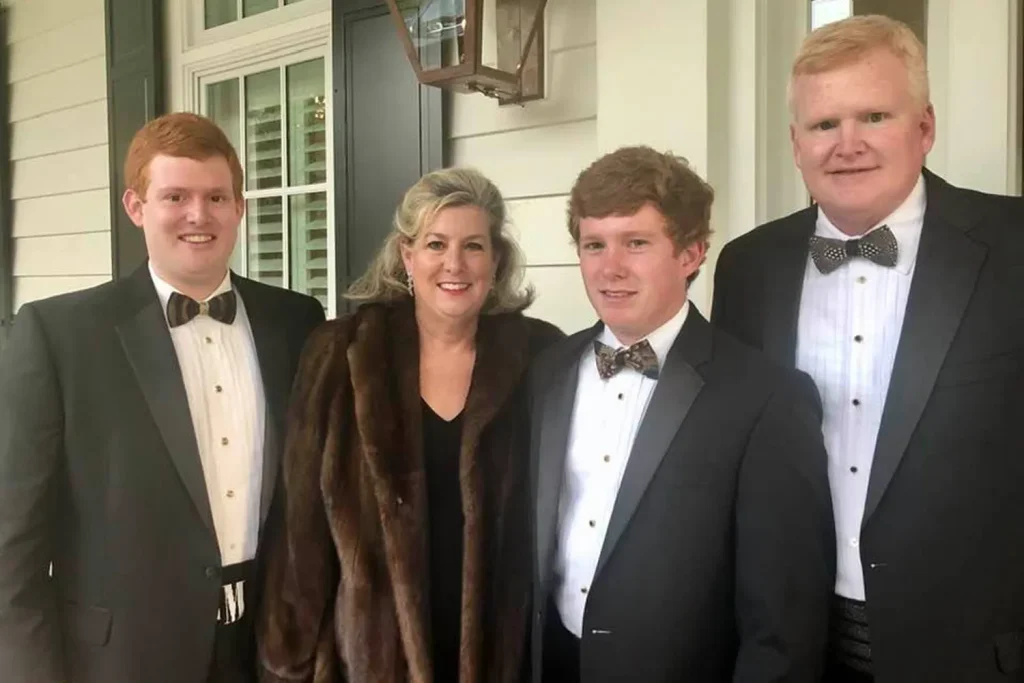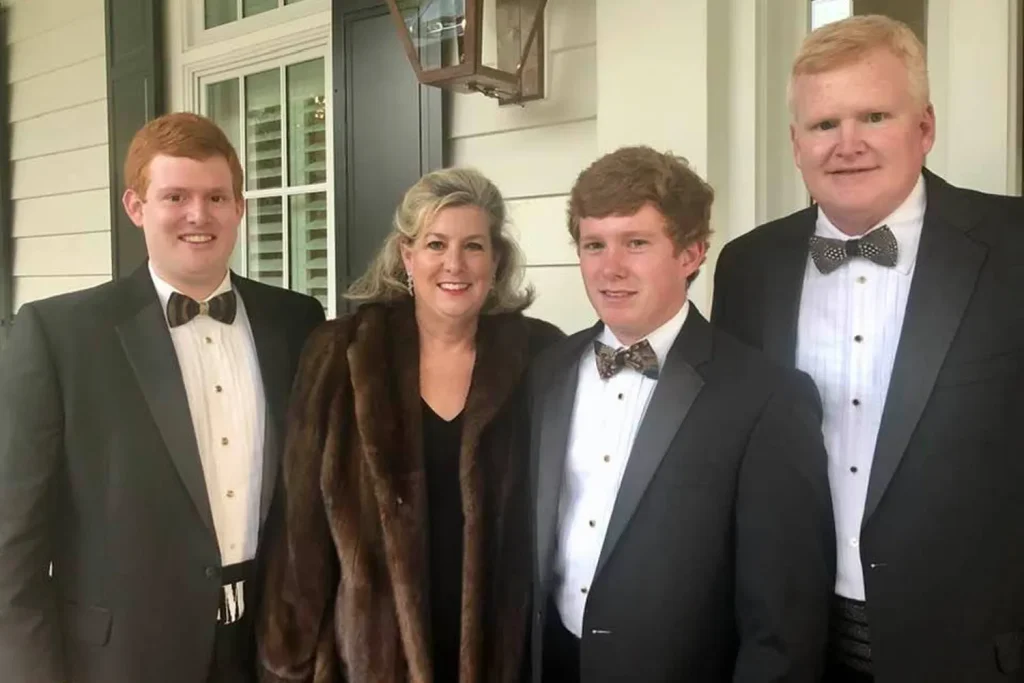Inside the Explosive Memoir of Alex Murdaugh’s Former Housekeeper Blanca Turrubiate-Simpson — Her Chilling Words: “I Knew He Did It”
When Blanca Turrubiate-Simpson drove up the long dirt road to the Murdaugh family’s 1,770-acre hunting estate in Islandton, South Carolina, on the morning of June 8, 2021, she knew something was wrong before she even opened the car door. The house looked still, lifeless — the air too quiet for a property that usually hummed with family chatter and dogs barking near the kennels. Maggie Murdaugh’s SUV was parked awkwardly by the side, her luggage still inside, her makeup bag untouched. Inside the laundry room, clothes lay out as though someone had been preparing for bed — pajamas, slippers, underwear. Except Maggie never slept in underwear. Blanca knew this. She had been her housekeeper, her friend, almost like family. And in that moment, the unease that settled in her chest would turn into something she could never shake.

Now, more than four years later, Turrubiate-Simpson is telling her story in a deeply personal book titled Within the House of Murdaugh: Amid a Unique Friendship – Blanca and Maggie, co-written with Mary Frances Weaver. The memoir, published in November 2025, is the latest chapter in a saga that has gripped the nation — the story of the once-powerful Murdaugh dynasty, and the unraveling that came with betrayal, greed, and murder.
For nearly fifteen years, Blanca worked for the Murdaugh family, managing their household and cleaning up after generations of privilege. But her relationship with Maggie went far beyond that of an employer and employee. They shared meals, exchanged stories, prayed together, and built a bond grounded in trust. “She wasn’t just my boss,” Blanca writes. “She was my friend.” That closeness makes the events of June 7, 2021, even harder to relive. That night, Maggie Murdaugh, 52, and her 22-year-old son, Paul, were brutally murdered on the property — a double homicide that would lead to the conviction of husband and father Alex Murdaugh, whose web of lies, theft, and deceit shocked even those who thought they knew him best.

When news broke the following morning, Blanca received a call from Alex himself. “They’re gone, B,” he told her. “They’re gone.” He wanted her to come to the house to help tidy up, explaining that family members would soon arrive. She agreed — but once she stepped inside, her instincts screamed that something was off. She noticed details that didn’t align with Maggie’s habits: her sandals in the wrong place, her pajamas laid out even though she hadn’t unpacked, and small inconsistencies in how the rooms were left. “It was as if someone had tried to make it look normal,” Blanca recalls in the book. “But it wasn’t.”
That morning, she also washed towels, cleaned bathrooms, and put away Maggie’s clothes — small acts of service she had performed a hundred times before. Yet each task carried a new heaviness. The house, once warm with Maggie’s laughter and Paul’s chaotic energy, felt haunted by absence. Later, when she saw police footage of the crime scene on television, something caught her eye — a towel that she recognized instantly. It was the same one she had washed and placed neatly on a laundry shelf just a day earlier. Now it was part of the investigation footage. That moment, she writes, was the one that broke her. “Oh my God,” she thought. “He did it.”
Blanca’s account adds rare firsthand insight into a case that has already been dissected by prosecutors, defense attorneys, documentarians, and millions of true-crime followers. During Alex Murdaugh’s 2023 trial, she testified about her interactions with the family, describing Maggie as “a wonderful woman” and Alex as increasingly “on edge” in the months leading up to the killings. Her testimony offered a glimpse of life inside the Moselle property — the family dinners, the small arguments, the routines that now seem eerie in hindsight. But in her book, Blanca goes beyond the courtroom. She reflects on the years of loyalty she gave to a family who, she says, never truly saw her as an equal. “To them, I was just the Mexican housekeeper,” she writes. “They never imagined I could see what I saw.”

It’s a painful confession — one that underlines the social dynamics that kept her quiet for so long. She recounts times when she tried to share concerns about Alex’s behavior or inconsistencies she noticed, only to be dismissed or ignored. Even after the murders, she says, her observations were treated as background noise in a case dominated by lawyers, law enforcement, and media attention. “Nobody asked me anything,” she remembers. “Nobody wanted to hear from the housekeeper.”
That silence pushed her to write. The book is not only a personal chronicle of trauma but also a tribute to Maggie, whose friendship and warmth Blanca still carries with her every day. “I want people to know who Maggie really was,” she told People in an interview. “She was kind, humble, and loving — she didn’t deserve what happened to her.”
The memoir also traces how the Murdaughs’ public image began to crumble long before the murders. By 2019, after the fatal boat crash that killed 19-year-old Mallory Beach — with Paul Murdaugh at the helm — the family’s aura of invincibility was cracking. Lawsuits, debt, and secrets loomed over Alex. Blanca writes that she could sense the tension escalating in the home. “There was pressure, something he was hiding,” she recalls. “You could feel it in the air.”

Through her writing, she paints a portrait of a man whose charm masked chaos. She remembers Alex as someone who could be jovial and generous, but also manipulative and controlling. In earlier years, he treated her with kindness — joking, offering help, sometimes showing gratitude. But later, she says, that same man seemed to vanish. “It was like something dark had taken over him,” she writes.
The publication of Within the House of Murdaugh comes as public fascination with the case remains high. Documentaries, podcasts, and online discussions continue to analyze every aspect of the Murdaugh legacy — from the family’s century-long legal influence in South Carolina’s Lowcountry to Alex’s elaborate financial fraud schemes that defrauded clients and friends of millions. Blanca’s voice, though, is different. It doesn’t come from the courtroom or the press gallery — it comes from the kitchen, the laundry room, the back porch where Maggie once sipped coffee at sunrise. It’s the view from the inside, told by someone who scrubbed the floors and folded the linens, all while witnessing a family disintegrate.
Still, Blanca’s story is not about vengeance. It’s about truth and healing. She writes about her decision to adopt Bubba, Maggie’s Labrador retriever, after the murders. The dog, once famous for chasing chickens around the Moselle property, now lives peacefully with her in her South Carolina home. In Bubba’s companionship, she finds both comfort and a living reminder of the woman she loved like a sister. “When I look into his eyes, I see Maggie,” she writes. “He’s the last piece of her I have left.”
There’s no denying that Blanca’s account will stir debate. Some readers will question the timing, others the motivation. But what can’t be ignored is her perspective — the quiet observer who saw the smallest details, the emotional shifts, and the inconsistencies that others may have overlooked. In her own words, “I was invisible for so long. This is my way of being seen.”
Her story also underscores something larger — the power imbalance between those who serve and those who rule. The Murdaughs’ world, as Blanca describes it, operated on unwritten rules: loyalty, secrecy, and reputation above all else. Speaking up was unthinkable. Only when the façade crumbled did she find the courage to share what she knew.
In one of the book’s most haunting lines, she writes: “I cleaned their home every day. I knew where everything belonged. But that morning, nothing was where it should be.” It’s both literal and symbolic — a reflection on how a world of privilege and power was built on disarray disguised as order.
As the nation continues to grapple with the aftermath of Alex Murdaugh’s conviction and the ongoing fascination surrounding his family, Blanca Turrubiate-Simpson’s story adds something rare: humanity. Beyond the headlines, beyond the legal twists, there’s a woman who mourns her friend, carries her memories, and still walks her dog each evening through the quiet streets of South Carolina, whispering Maggie’s name when the breeze passes through the trees.
“I knew he did it,” she writes in the final chapter. “But what I didn’t know was how to live with it.”


